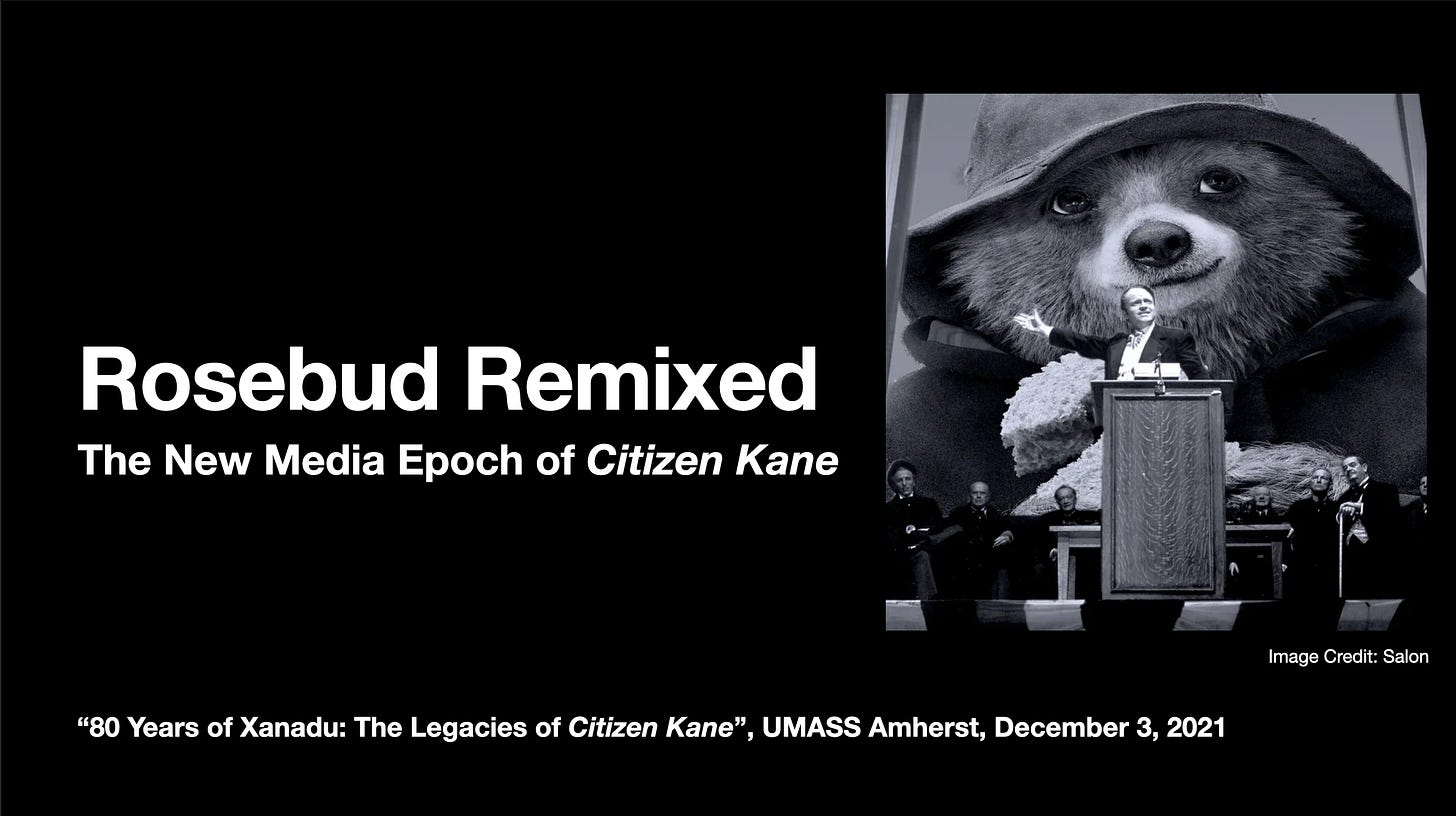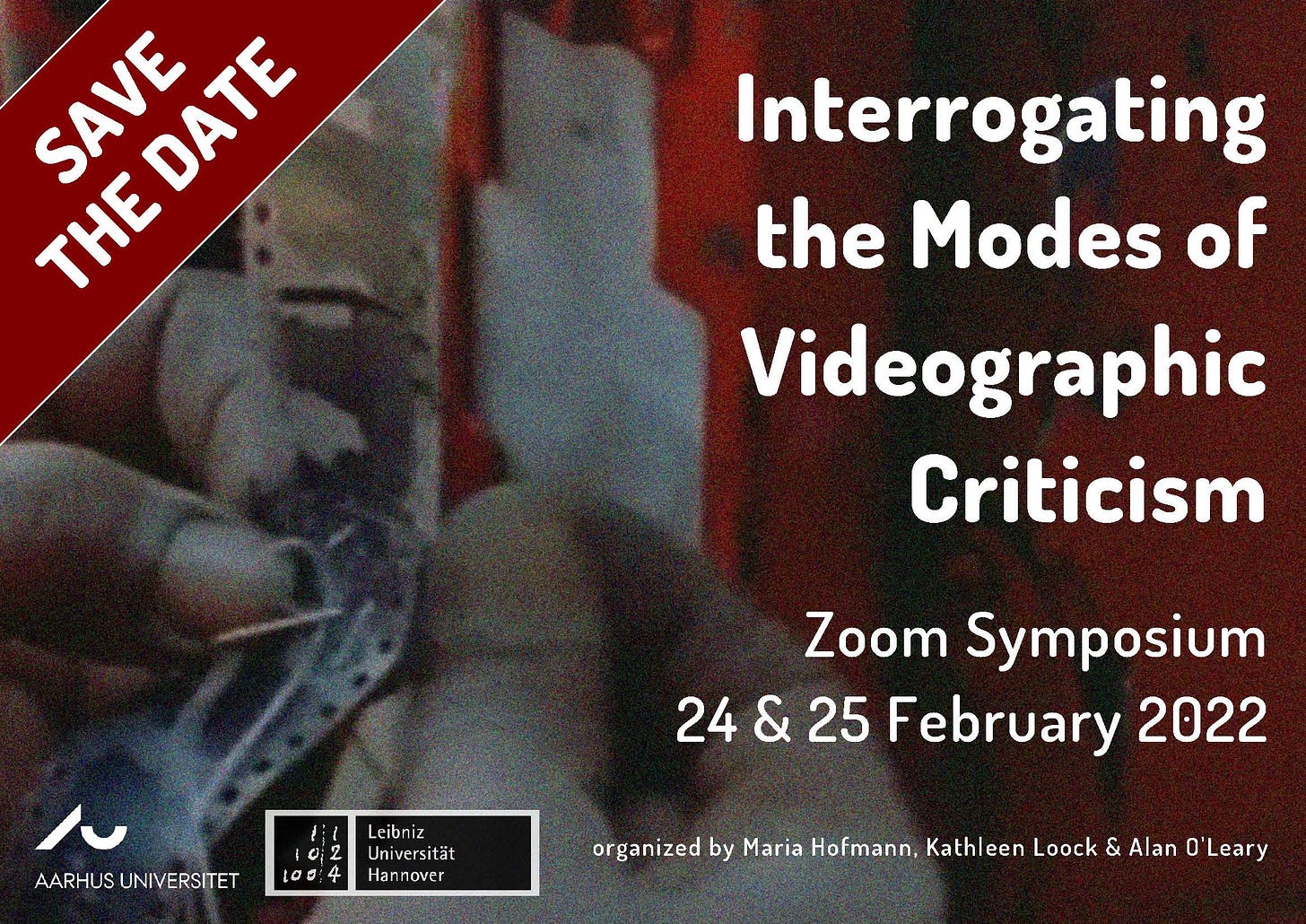Volume 2, Issue 13: Rosebud Remixed
Plus a bunch of exciting news and notes from the videographic world
On Friday, I had one of the coolest experiences of my life. I traveled to the University of Massachusetts Amherst where I was invited to deliver a keynote address at the conference, “80 years of Xanadu: The Legacies of Citizen Kane.”
The conference was organized by Nefeli Forni Zervoudaki and featured a fantastic group of presenters. You can learn more about the event and the other folks who presented here.
I titled my presentation “Rosebud Remixed: The New Media Epoch of Citizen Kane.” My abstract:
Eighty years after the release of Citizen Kane, where is one most likely to encounter one of the most important and influential films ever made? The answer for many may be on digital platforms like YouTube, Vimeo, and TikTok, where the film and its legacy continue to be analyzed, celebrated, challenged, and remixed by scholars, critics, and fans. This presentation will center on the current remix culture surrounding Orson Welles’ 1941 film, with a special focus on the ways the burgeoning field of audiovisual criticism has ushered in a new way to see Citizen Kane in the digital era.
I think the presentation turned out alright! Here is my first slide:
But the highlight of the presentation was by far and away what came at the end: we made a video essay together! Or more specifically, a Videographic PechaKucha, in real time. Members of the audience shouted out their favorite scenes and we took six-second clips from ten of those scenes to assemble the video. The night before the talk, I asked Nefeli to name her favorite scene from the film and we used one minute of audio from that scene in the piece.
Some direct quotes from after the screening: “Wow, that actually had some rhythm" and "The video had no business being that good."
I think it turned out great! Have a look:
Many, many thanks to Nefeli for organizing the event, and also to Barbara Zecchi and Daniel Pope for helping make it all happen. It was such a honor to be invited and I learned so much from the other presentations!
I also want to share a brilliant video essay screened at the conference by Emily Su Bin Ko, an undergraduate student at UMass, titled, “Citizen Kane: transcending Bazin’s dichotomy.” Watch here:
Support the Show on Patreon
Please consider supporting this newsletter, the podcasts, and the other work I do on Patreon! Subscribers now get exclusive access to “video essay guides” to certain topics every other (for the most part) Monday. The most recent guide is “Watching kogonada, Part I” Learn more and support the show here.
The latest guide will be posted this week!
Video Camp 2022
The Scholarship in Sound & Image Workshop will return next year! Christian Keathley and Jason Mittell will be leading the workshop at Middlebury College from June 19 - July 2, 2022. The application deadline is February 1, 2022.
I’m giving Video Camp a special place in this newsletter because, as many of you know, I was the teaching assistant at the 2019 workshop, and if I had not had that truly life-changing experience, this newsletter would not be in your inbox right now!
From their call for applications:
Developments in digital technology afford exciting new possibilities for conducting analysis and conveying arguments in a multimedia form about multimedia objects of study through works commonly known as ‘videographic essays.’ Professors Christian Keathley and Jason Mittell will lead a two-week workshop at Middlebury College in Vermont from June 19 – July 2, 2022, where participants will learn how to conceive and produce film & media criticism via digital sound and moving images.
The workshop will serve 15 participants, whose objects of study involve audio-visual media, especially film, television, and other new digital media forms. Participants should be scholars working in film & media studies or a related field – the workshop is appropriate for faculty, graduate students, or academic professionals. All participants must be fully vaccinated against COVID-19 before the start of the workshop.
Read more about the workshop and the application process here.
I also want to give a special shoutout to an event I will be participating in next year, an online symposium titled, “Interrogating the Modes of Videographic Criticism.” I’ll be leading a workshop with Cydnii Wilde Harris on day two of the symposium.
As Cydnii recently said to me when we were planning for our event, “We’re the Mary-Kate and Ashley of videographic criticism.” And if that’s not enough proof that this will be a fun and engaging event, I don’t know what is! Apart from, of course, the wonderful event description that I have included below:
Located at the intersection of art, scholarship, and personal exploration, videographic criticism refers to the study of audiovisual culture in audiovisual form. The videographic critic uses editing software to produce analyses and commentaries about film, television, games, online material etc., and typically communicates the results in the form of video essays. The practice of videographic criticism has grown exponentially in recent years, and the increased focus on screens that has been for many the experience of the COVID-19 pandemic has only confirmed the relevance of videographic criticism and its set of concerns.
This two-day Zoom symposium will dedicate day 1 to interrogating the affordances and knowledge claims of three distinctive modes of videographic practice in panels dedicated to the desktop documentary, the personal exploration, and parametric/deformative approaches. On day 2, all participants will be invited to define and debate the key issues for the development of videographic criticism in parallel workshops, and a closing roundtable will recapitulate the symposium findings and set out themes and questions to be considered at future events. The symposium will feature emerging as well as established voices in order to build networks and to expand the community of videographic practitioners, and is run over two days to work for as many time zones as possible.
The symposium is co-organised by Maria Hofmann (hofma071@umn.edu), Kathleen Loock (kathleen.loock@engsem.uni-hannover.de) and Alan O’Leary (aoleary@cc.au.dk), and will be run from the Department of Media and Journalism Studies, Aarhus University.
Venue: Zoom
Dates: 24 and 25 February 2022
Times: TBC (but late afternoon/evening CET to accommodate as many time zones as possible)
I’ll be sure to include more information here in the lead up to the event!
More News & Notes
Please send news and notes for future newsletters to willdigravio@gmail.com
December
On December 16, Leigh Singer will be teaching a master class on the video essay for Little White Lies. More here.
The team at Sonic Scope is looking for people to join the editorial board of their journal. The deadline is December 16. More here.
The Essay Film Festival is hosting an event titled, “Diaries, Notes & Sketches: A talk by Andrés Di Tella with a screening of Private Fiction (2019)” on December 17. More here.
January
CFP: “Two forthcoming volumes of the journal Interfaces, available on OpenEdition, will bring together written articles and video essays that explore the ways in which the production, circulation and reception of images today involves ‘rescaling’ the visible, and, by extension, our experience of the visible, in increasingly radical ways.” The deadline for abstracts is January 10, 2022. More here.
February
Screenworks has a new call for practice for a new special issue on “Musicology on Screen” edited by Estrella Sendra, Barley Norton and Joseph Owen Jackson. The deadline for proposals is February 1, 2022. Learn more here.
More Notes (New)
A Twitter thread by Lucy Barnes chronicling a talk given by Miklós Kiss on the video essay and his experience co-writing Film Studies in Motion. Read here.
Animation Studies 2.0 put out a call for video essays for their blog. More here.
A new video essay dossier on television is up at Filmscalpel. Find here.
Cydnii Wilde Harris interviewed Maya Cade, creator of the Black Film Archive, for Hyperallergic. Read here.
Scout Tafoya’s essential video essay series for RogerEbert.com turned 8-years-old this month. Happy birthday, Scout!
The brilliant documentary/essay film All Light, Everywhere by Theo Anthony is now available to stream on Hulu.
A fun note from Ariel Avissar sharing the wisdom of Kevin B. Lee:

More Notes (Old)
The latest issue of [in]Transition is here! Watch and read here.
A thread all interested in video essays should read from Thomas Flight. The thread concerns copyright, HBO, YouTube, and Thomas’ recent video essay on Dune (2021). Read here.
“The Essay Library Anthology, Vol. 3: Death” is now here! The project is a compilation of 60-second micro-essays from 18 creators each exploring the theme of “death” from a different angle. More here.
Nelson Carvajal chatted with Ava DuVernay about the essay film genre and how its used in her latest work, Colin in Black and White. Watch a clip here.
Preview to Episode 29. Thomas Flight
If all goes to plan the next episode of The Video Essay Podcast will drop later this week and feature a conversation with Thomas Flight. On the show, Thomas and I discuss a wide range of topics, including two videos in great detail: “The Side of Scorsese We Don’t Talk About” and Jacob Geller’s “The Game That Won’t Let You See All of It.” Watch both below.





